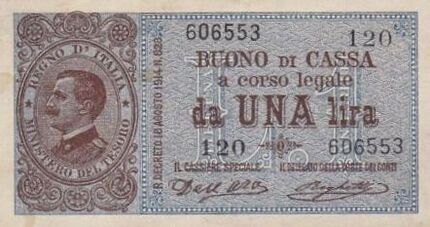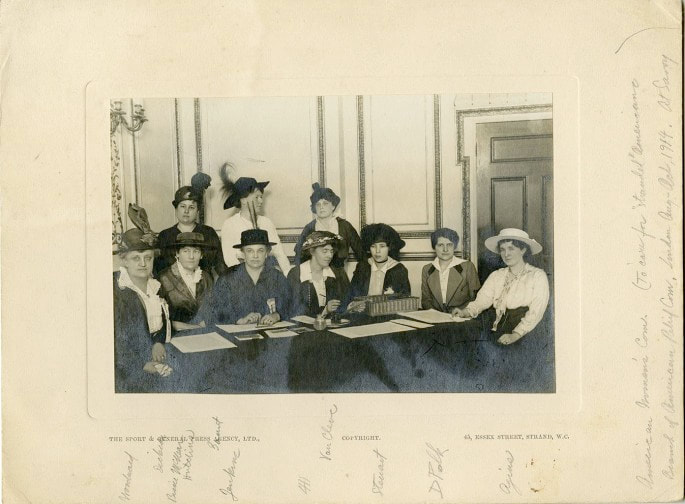|
The story of The American Relief Committee (ARC) 1914  1914 Italian Lira note 1914 Italian Lira note Imagine you are on your Grand Tour of Europe in 1914. La Dee Da, life is wonderful. Until it isn't. Uh oh! Imagine, overnight, war breaks out. No phones, no airplanes, no ATM's, no credit cards, most trans-Atlantic ships have ceased operations, and the ones that are leaving - are leaving from England. There you are in Florence, Italy with 150,000 lire. YOU! The daughter/son of a robber-baron (ooops sorry! Philanthropist) with positively scads of money back home in reliable J.P. Morgan & Co. But your letter of credit is worthless without a bank - and all the London banks are closed. Why does this matter? Because to exchange money and to transact almost any financial matter in 1914 required it to pass through London Banks. You can't get your money, and no-one can send you any. Click "Read More" to see Daisy in 1914 and learn more about how stranded Americans got home! Eee Gads! All your Lira are worthless outside Italy. So you go to the nearest American Consulate, "Sorry! We are in the same predicament." they tell you. "Maybe you should go to London." And some consulates lent Americans enough for a train ticket. Because in fact, you are in good company with an estimated 120,000 of your fellow Americans all trying to leave from "The Continent". It happened. Want to know how you got home? You can thank the ladies above who are taking a break from their work as the American Relief Committee. Aug 4, 1914: 11:00 pm War is declared.
When World War I began, most panicked tourists headed to the nearest English speaking port - London. And then - next stop - to the consulate and embassy. London hotels were overwhelmed and could not meet the demand. Hotel, bank and general service employees rush to enlist. Telegraphs - the mode of communique - become unavailable because telegraph operators are needed for the war effort. Borders are blocked. Trains, horses, and ships are now appropriated for troop carriage and the few steamships still operating can not meet demand. Luckily Herbert and Lou Hoover were living in London and had a solid history of organizing something-from-nothing in mining operations around the world. The Hoovers had prospered from it and were living as millionaires in London. Mr. Hoover recalls, "... American Consul General Skinner ... said that there was a mob of a thousand American tourists milling around within the Consulate and in the street, all of whom were penniless because they could raise no money on travelers' checks or other credit documents. In the panic even American currency was refused by London hotels. Except for old customers they could not even get food or lodgings. Could I think of anything to do?" It was chaos. Hoover gathers a few hundred pounds from his personal and Lou's household funds and makes loans to stranded tourists accepting IOUs and foreign currency exchange notes. But they both agree more needs to be done. Aug 5: The Hoover's organize about 20 Americans in London (Daisy was one of them) into a Committee of American Residents in London for the Assistance of American Travellers. They set up operations at The Savoy Hotel Ballroom and three other locations with 48 hours. The Committee, whose honorary chairs are the U.S. Ambassador Walter Hines Page and his wife, organizes a transatlantic line for Americans to access and wire funds by gathering and guaranteeing funds from Americans and other wealthy individuals in London, including their personal funds. Herbert then notifies Ambassador Page to inform American in Europe through the consulates to come to London for help. Aug 6: Meanwhile, Fred Kent, V.P. of Bankers Trust Co. was in Europe and had already organized a group of bankers as the American Citizens Committee (ACC) to distribute loans to qualified individuals. And that left out many stranded Americans without means. This committee was also not involved with the diminishing resources and needed logistics to house, clothe and help with transport arrangements for the thousands stranded in London. Kent was a leading expert in Foreign Exchange and the Bankers Trust, founded in New York, had J.P. Morgan as its controlling stockholder. Follow the money. Meanwhile rather than work collaboratively, The Hoover committee was being excluded from ACC meetings with Page. Hoover shrewdly telephones his friend Lindon W. Bates, an American Civil Engineer of some note (think Panama Canal), and asks he request President Wilson appointment him THE special commissioner to consolidate operations for the return of stranded Americans. Wilson had never heard of Hoover prior to this intervention. Bates makes that introduction and he and his wife Josephine remain very involved with the Hoovers until they loose their son on the Lusitania sinking the following year (another story). The ACC bankers, without Hoover in attendance, asked Ambassador Page to formally request funds from Congress. With the banker guarantees, Congress approves an advance of $2,500,000 in gold. It was onboard the USS Tennessee that same day. Hoover continued to move forward with organizing and distributing private funds he could raise quickly. He reserves 2,000 rooms in hotels and boarding houses secured with these funds. Aug 9: $300,000 becomes available immediately from the Congressional advance and Ambassador Page hands Kent's bankers the money vs Hoovers volunteers who were working around the clock distributing $10,000 a day interest free and helping with direct assistance in clothes, housing, meals and tickets. The ACC lends small amounts to the Hoover Committee. Tensions between committees grow. Aug 17: War Department Asst. Secretary Breckenridge arrives with a delegation of 24 staff to help with evacuation. Hoover is frustrated because his group of volunteers have systems and operations organized giving assistance, while the bureaucrats are having meetings and deliberations. Hoover makes a case for undivided management of the Congressional funds to minimize the chaos, use resources effectively and deliver help immediately through already organized volunteer channels. Sec. Breckenridge is dismissive of Hoover at first. But Hoover's unwavering persistence, aided by Bates and President Wilson's official approval received, effectively consolidates operations. It should be noted that Lou Hoover's friendship with Ambassador Page's wife most certainly helped too. Mrs. Page worked alongside Lou on the women's committee. Secty. Breckenridge agrees to work with Hoover to oversee system changes for government compliant approvals, requisitions and duplicate forms. Aug 18: Kent's Committee reluctantly disbands. Aug 23: In a private letter to President Wilson, Ambassador Page reported that "the organization and measures for helping our stranded people were energetic and right… thanks to the Americans of ability who conducted the American Relief Committee (ARC)." Hoovers group shortened their name and filed reports at the end of the relief period as the ARC. After all was concluded, Mr. Hoover wrote in his memoirs. "The details of organization are not important. But some results are of interest in the study of American character. During the six weeks following we handled some 120,000 troubled Americans who streamed in from all over Europe—and among them 30,000 teachers. Altogether we paid out (outside of charity) something more than $1,500,000 and lost something less than $300. It was a monument either to the shrewd judgment of our youngsters or to the honesty of the American school teacher and traveler. Our private financial operations ended in the latter part of August." Hoover goes on to paint a picture of the diversity of the stranded travellers. Among them; "There was the lady who declared a hunger strike because we would not send her home at our expense in better quarters than the steerage. Our ladies gave her an easy chair in our lunch room where the constant display of food broke her iron will within a few hours. And there was the elderly lady who demanded a written guarantee that the submarines would not sink the ship. We gave it to her." And the Cowboys and Indians? You can't make this stuff up! Yes, read that story here. References:
0 Comments
Your comment will be posted after it is approved.
Leave a Reply. |
Some stories that couldn't make the book in full ... but need to be told! Editors welcomed - sign up below.
STORIES
WR HEARST PLANS SONG: DAISY HOT SPRINGS 1882 A WILLIS POLK GIFT THE RLS CONNECTION 1896 EARTHQUAKE TALES FROM COPPA PANDEMIC OF 1889 THE BOMB THAT SHOOK SF MILAN:CITY OF WATER POLK ON THE MAP FEATHERS, FASHION & FLY FISHING RARE AVIATION FILM - WWI 1914-17 1906 SAN FRANCISCO WTF FILES - TECHNOLOGICAL GET ME OUTTA HERE! NO HORSES, NO TENTS, NO $ DAISY IN FRENCH LITERATURE DAISY ON FILM! THE WHITE DEATH THE SYMBOLISM OF FLOWERS POSTE DE SECOURS WWI TRAVEL 1900: LONDON TO PARIS DAISY: REST IN PEACE KEITH'S, DRANE'S & KENTUCKY MOTHER: MISSOURI COMPROMISE Topics
All
|


 RSS Feed
RSS Feed